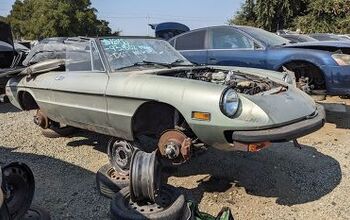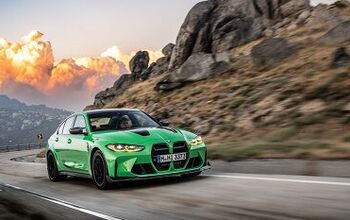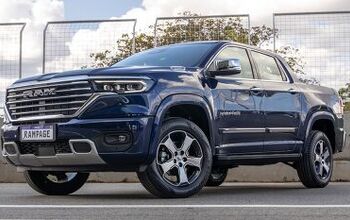BMW Group Signs Deal to Build Electric Minis in China

BMW Group has signed with Great Wall Motors to produce Mini-branded vehicles in China. This is the German automotive group’s second joint venture in the region and will not affect its current alliance with Brilliance Auto — which builds BMW models specifically equipped to appeal to the Chinese market.
The same will be true for the Mini deal with Great Wall, as the entirety of the production line will be electric vehicles. While the main reason for this is to ensure BMW hits its government-imposed quota for EVs, Great Wall said the venture would help it meet the needs of Chinese consumers and tap into the new energy vehicle market both home and abroad.
Mini has said a production version of the Mini Electric Concept won’t happen until November of 2019, but there’s been buzz that the automaker may seek widespread electrification after that. Interestingly, Chinese Minis will use a new platform developed by the joint venture, rather than rely on whatever architecture the Western-built EV adheres to. That’s two separate plug-in product lines. Will EV exclusivity be the future of the brand?
With automakers scrambling to meet strict new targets in China, — which has called for electric and rechargeable hybrid vehicles to account for a fifth of an automaker’s total sales by 2025 — BMW Group could be positioning Mini to assume the majority of the responsibility. However, as a separate marque with a completely different partner, it’s unlikely the Mini EVs will count toward the rest of the auto group’s total.
Instead, Mini might serve as a testbed to help BMW make up its mind on how to approach the Chinese rules. Larger companies will be expected to produce over a million plug-ins in just a couple of years to satisfy the new electrification and fuel economy requirements. The catch is, the consumer base doesn’t yet purchase enough of them to support those numbers. An automaker could be diving headlong into disaster if it isn’t totally prepared.
Reuters reported that the Chinese venture could start making the electric Mini in 2021 or 2022, adding it would also produce models under the Great Wall brand.
Analysts at Bernstein claim they were confused as to why BMW opted to have a minority stake in the deal. Holding less than than a 50-percent stake would give Great Wall rights to any intellectual property the two companies develop together. Neither company has been willing to elaborate further on the deal.
“Next steps will be to agree on the details of a possible joint venture and cooperation agreement and clarify aspects such as the choice of production location and concrete investments,” BMW said. It a separate statement, it also explained it would further expand its alliance with Brilliance.
[Image: BMW Group]

A staunch consumer advocate tracking industry trends and regulation. Before joining TTAC, Matt spent a decade working for marketing and research firms based in NYC. Clients included several of the world’s largest automakers, global tire brands, and aftermarket part suppliers. Dissatisfied with the corporate world and resentful of having to wear suits everyday, he pivoted to writing about cars. Since then, that man has become an ardent supporter of the right-to-repair movement, been interviewed on the auto industry by national radio broadcasts, driven more rental cars than anyone ever should, participated in amateur rallying events, and received the requisite minimum training as sanctioned by the SCCA. Handy with a wrench, Matt grew up surrounded by Detroit auto workers and managed to get a pizza delivery job before he was legally eligible. He later found himself driving box trucks through Manhattan, guaranteeing future sympathy for actual truckers. He continues to conduct research pertaining to the automotive sector as an independent contractor and has since moved back to his native Michigan, closer to where the cars are born. A contrarian, Matt claims to prefer understeer — stating that front and all-wheel drive vehicles cater best to his driving style.
More by Matt Posky
Latest Car Reviews
Read moreLatest Product Reviews
Read moreRecent Comments
- Calrson Fan Jeff - Agree with what you said. I think currently an EV pick-up could work in a commercial/fleet application. As someone on this site stated, w/current tech. battery vehicles just do not scale well. EBFlex - No one wanted to hate the Cyber Truck more than me but I can't ignore all the new technology and innovative thinking that went into it. There is a lot I like about it. GM, Ford & Ram should incorporate some it's design cues into their ICE trucks.
- Michael S6 Very confusing if the move is permanent or temporary.
- Jrhurren Worked in Detroit 18 years, live 20 minutes away. Ren Cen is a gem, but a very terrible design inside. I’m surprised GM stuck it out as long as they did there.
- Carson D I thought that this was going to be a comparison of BFGoodrich's different truck tires.
- Tassos Jong-iL North Korea is saving pokemon cards and amibos to buy GM in 10 years, we hope.


































Comments
Join the conversation
Great. A Mini with a huge back seat and a battery. Sign. Me. Up.
1. To most folks, a Mini and a Fiat 500 look nearly identical. 2. In the US, EVs sell mostly in California. 3. California is already awash in Fiat 500e electrics, which can be leased new for peanuts or bought used for pocket change. 4. So since the new Mini EV was announced, I have been wondering, where on earth does Mini think they're going to sell it? Now we know: China! (But on a new platform...presumably engineered to omit the costly bits, such as safety and durability.)